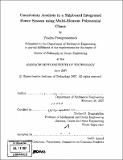| dc.contributor.advisor | Michael S. Triantafyllou. | en_US |
| dc.contributor.author | Prempraneerach, Pradya, 1975- | en_US |
| dc.contributor.other | Massachusetts Institute of Technology. Dept. of Mechanical Engineering. | en_US |
| dc.date.accessioned | 2009-01-23T14:53:53Z | |
| dc.date.available | 2009-01-23T14:53:53Z | |
| dc.date.copyright | 2007 | en_US |
| dc.date.issued | 2007 | en_US |
| dc.identifier.uri | http://hdl.handle.net/1721.1/40364 | |
| dc.description | Thesis (Ph. D. in Ocean Engineering)--Massachusetts Institute of Technology, Dept. of Mechanical Engineering, 2007. | en_US |
| dc.description | Errata, dated Oct. 30, 2007, inserted between pages 3 and 4 of text. | en_US |
| dc.description | Includes bibliographical references (p. 301-307). | en_US |
| dc.description.abstract | The integrated power system has become increasingly important in electric ships due to the integrated capability of high-power equipment, for example, electromagnetic rail guns, advance radar system, etc. Several parameters of the shipboard power system are uncertain, caused by a measurement difficulty, a temperature dependency, and random fluctuation of its environment. To date, there has been little if any studies which account for these stochastic effects in the large and complex shipboard power system from either an analytical or a numerical perspective. Furthermore, all insensitive parameters must be identified so that the stochastic analysis with the reduced dimensional parameters can accelerate the process. Therefore, this thesis is focused on two main issues - stochastic and sensitivity analysis - on the shipboard power system. The stochastic analysis of the large and complex nonlinear systems with the non-Gaussian random variables or processes, in their initial states or parameters, are prohibited analytically and very time consuming using the brute force Monte Carlo method. As a result, numerical stochastic solutions of these systems can be efficiently solved by the generalized Polynomial Chaos (gPC) and Probabilistic Collocation Method (PCM). | en_US |
| dc.description.abstract | (cont.) In the case of the long-time integration and discontinuity in the stochastic solutions, the multi-element technique of PCM, which refines the solution in random space, can significantly improve the solutions' accuracy. Furthermore, the hybrid gPC+PCM is developed to extend the gPC ability to handle a system with nonlinear non-polynomial functions. Then, we systematically establish the convergence rate and compare the convergence performance among all numerical stochastic algorithms on various systems with both continuous and discontinuous solutions as a function of random dimension and the algorithms' accuracy governing parameters. To identify the most significant parameter in the large-scale complex systems, we propose new sensitivity analysis techniques - Monte Carlo Sampling, Collocation, Variance, and Inverse Variance methods - for static functions and show that they agree well with Morris method, which is one of the existing sensitivity analysis techniques for a function with large input dimensions. In addition, we extend the capability of the Sampling, Collocation, Variance, and the Morris methods to study both the parameters' sensitivity and the interaction of the ordinary differential equations. | en_US |
| dc.description.abstract | (cont.) In each approach, both strength and limitations of the sensitivity ranking accuracy and the convergence performance are emphasized. The convergence rate of the Collocation and Variance methods are more than an order of magnitude faster than that of Morris and Sampling methods for low and medium parameters' dimensions. At last, we successfully apply both stochastic and sensitivity analysis techniques to the integrated shipboard power system, with both open-and close-loop control of the propulsion system, to study a propagation of uncertainties and rank parameters in the order of their importance, respectively. | en_US |
| dc.description.statementofresponsibility | by Pradya Prempraneerach. | en_US |
| dc.format.extent | 307 p. | en_US |
| dc.language.iso | eng | en_US |
| dc.publisher | Massachusetts Institute of Technology | en_US |
| dc.rights | M.I.T. theses are protected by
copyright. They may be viewed from this source for any purpose, but
reproduction or distribution in any format is prohibited without written
permission. See provided URL for inquiries about permission. | en_US |
| dc.rights.uri | http://dspace.mit.edu/handle/1721.1/7582 | en_US |
| dc.subject | Mechanical Engineering. | en_US |
| dc.title | Uncertainty analysis in a shipboard integrated power system using multi-element polynomial chaos | en_US |
| dc.type | Thesis | en_US |
| dc.description.degree | Ph.D.in Ocean Engineering | en_US |
| dc.contributor.department | Massachusetts Institute of Technology. Department of Mechanical Engineering | en_US |
| dc.identifier.oclc | 188062844 | en_US |
